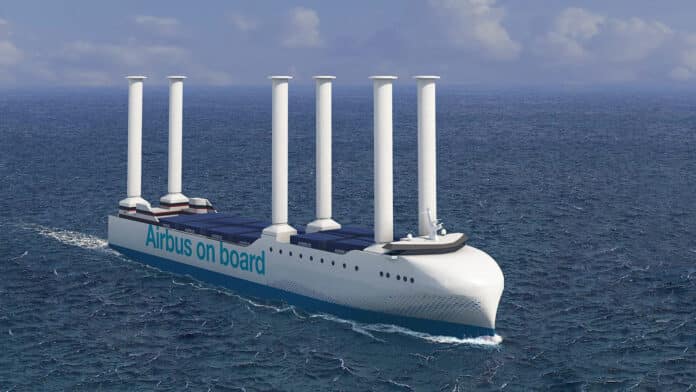Airbus is committed to sustainable aerospace and reducing its environmental footprint. As part of this vision, the company is renewing its maritime fleet that transports aircraft components between production sites with modern, low-emission vessels supported by wind-assisted propulsion.
By 2030, Airbus aims to cut its Atlantic fleet fuel consumption and CO2 emissions by 50% compared to 2023 and achieve even greater reductions in the following years.
The company has partnered with shipowner Louis Dreyfus Armateurs to build, own, and operate new, highly efficient roll-on/roll-off cargo vessels that will enter service in 2026. These vessels will carry aircraft assemblies between production facilities in Europe and the United States.
Each ship will be powered by a combination of six Flettner rotors and two dual-fuel engines. The engines will run on maritime diesel oil, wind-assisted technology, and e-methanol produced by combining green hydrogen and captured carbon dioxide. The percentage of e-methanol in the mix is expected to increase over time, leading to further emissions reduction.
Each new transatlantic vessel will be able to carry more cargo and aircraft parts than the current ones. They will have the capacity to transport around seventy 40-foot containers and six single-aisle aircraft subassembly sets – wings, fuselage, engine pylons, horizontal and vertical tailplanes – compared to four today for the Ville de Bordeaux and three for the City of Hamburg.
Additionally, routing software will optimize the vessels’ journey across the Atlantic, maximizing wind propulsion and avoiding drag caused by adverse ocean conditions.
This will help Airbus increase its production and meet the demand for its planes. The extra capacity could also be used to cater to the transport needs of other Airbus divisions or partners. It could also be harnessed to carry humanitarian aid on behalf of the Airbus Foundation.
The new Atlantic maritime fleet is expected to reduce average annual transatlantic CO2 emissions from 68,000 to 33,000 tonnes by 2030. This will contribute to Airbus’ commitment to reduce its overall industrial emissions by up to 63% by the end of the decade, in line with the 1.5°C pathway of the Paris Agreement.
This major reduction would be achieved by increasing the percentage of e-methanol in the new vessels’ dual-fuel propulsion as more of the fuel becomes available.
